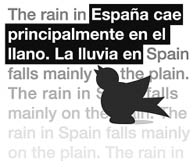No perdido en la traducción

TZIGANE
The market for translation is, to put it simply, exploding — growing at a rate of 15 to 20 percent per year. "There is a growing need internationally to be able to translate in more than two languages," explains James Archibald, director of McGill's Department of Translation Studies. In response to the growing popularity of Spanish as a third language in Quebec as well as the desire of Canadian translators to be more competitive internationally, McGill is launching a new program in Spanish translation.
According to the Language Industry Association of Canada, the country is among the top suppliers of language services in the world, but supply isn't meeting demand. Although Canada needs about 1,000 new translators a year, universities produce only 300 to 400. "As a result," explains Archibald, "there is a lot of out-sourcing and recruiting abroad. Unless we can get people into the market and working properly here, I don't think that the problem is going to get solved."
The choice of Spanish as the third language is no coincidence. "Quebec is doing a lot of business with Latin America," says Archibald, and Spanish speakers also comprise the largest ethnocultural community in Quebec. Therefore, for those students who plan on travelling abroad after graduation, McGill's new program "increases [their] mobility, not only locally but nationally as well," explains Archibald.
The program, which will begin this September, is offered both at the graduate and undergraduate levels and will be as competitive as the field, requiring an entrance examination in addition to a formal application (due June 1).
Archibald also stresses that translation is important from a cultural viewpoint. The field entails not only writing, but also communicating and engaging in an inter-cultural explosion. "It's not a monk sitting in a cell translating psalms: it's a person out there engaging. It's a real social, cultural, political and economic situation," says Archibald.
For more information, contact Katherine Peacock at 398-1484 or send an email. An information session about the program requirements and curriculum will take place on May 8 at 688 Sherbrooke St. West, Room 1041, at 6:00 p.m.

